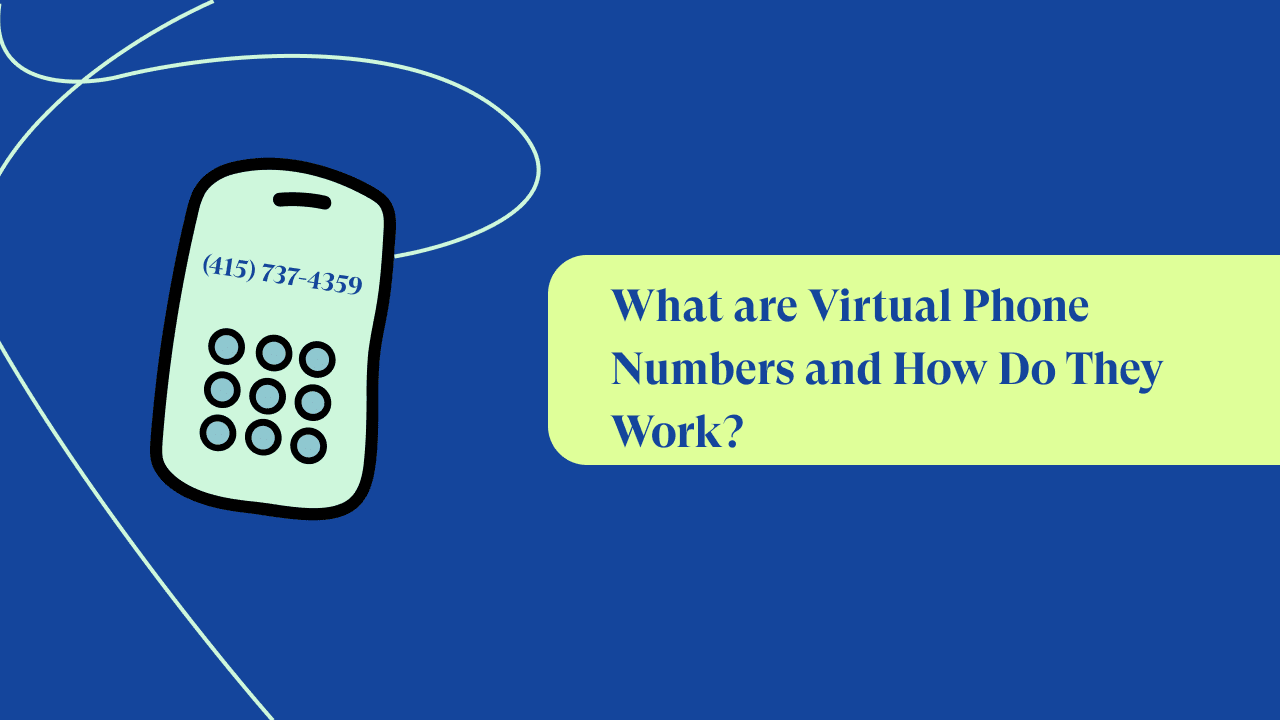So, Alexander Graham Bell rang up the world with the first phone call in 1876. Picture this: a guy in a top hat chatting through a gadget that’s more antique than your grandma’s teacups. Fast forward to now, and we’re still tied down? Nope, that’s old school!
If you’re still glued to your desk phone, wrestling with a spaghetti monster of phone wires, thinking, “There must be a better way!” then, well… You’re right!
Let us introduce you to the new standard in the communication world: virtual phone numbers. They let you and your employees work from home, in a cafe, or anywhere else you need. With virtual phone numbers, it’s all possible!
They’re not just about ditching the wires; they’re about dialing into the future. You can easily set up a local or international presence, giving your business a global footprint without the need for physical offices in different locations.
So why stay stuck in the past with outdated technology? Learn more about virtual phone numbers in this article and see how your business can benefit.
TL;DR
| >Virtual phone numbers are internet-based numbers that allow you to make and receive calls from any device, anywhere, without needing a traditional phone line. >They allow for working from anywhere, streamline communications, and give a professional edge. >To make a virtual phone number work wonders for your business, remember to use it to enhance flexibility, improve customer interaction, and integrate seamlessly with your existing systems. >JustCall stands out as an easy-to-use, feature-rich option that supports business growth and adapts to your communication needs. |
What are virtual phone numbers?
Virtual phone numbers are like regular phone numbers but work over the internet. You can use them to make and receive calls on any device, anywhere, even without a traditional phone line. People calling you or receiving your calls won’t know it’s a virtual number.
Virtual phone numbers enable you to have a local number without needing a physical landline. These numbers are connected to your device instead of a specific location, allowing you to make calls from anywhere in the world, regardless of your actual physical location.
How does a virtual number work?
Virtual numbers aren’t tied to EPABX systems, SIM cards, or wired networks. They can be stored on a cloud platform that routes calls between two or more parties based on pre-set conditions.
You can call a virtual number, including toll-free numbers, just like a regular phone line. These incoming calls can be routed automatically based on location, time of call, etc., or they can be sent to an IVR, which can route the call based on what they want to talk about.
Your field sales agents can make secure calls to customers from your CRM application, which is then routed through the virtual number.
- Your employees can make and receive secure calls from anywhere using their own landlines or cell phones.
- Call flows can be set up based on your business needs.
- You can choose which devices you want to make calls work on.
- You can turn on things like simultaneous ringing, call recording, analytics, and more.
A single virtual phone number can be linked to various channels, allowing a caller to speak with a live agent without waiting in line.
Difference between traditional & virtual phone numbers
Virtual Phone Numbers:
- Device Independence: Virtual numbers aren’t tied to specific devices or locations, offering remarkable flexibility.
- Communication Flexibility: They support various communication platforms, enhancing operability through advanced call routing options.
- Online Data Management: Data backup is straightforward and secure, with all information stored online, eliminating the need for physical storage and facilitating easy access.
- Cost-Efficient: With typically no long-term contracts, virtual phone services offer financial flexibility, freeing businesses from hefty investments or ongoing expenses.
Traditional Phone Numbers:
- Device Dependency: These numbers rely on SIM cards and dedicated devices, restricting mobility and flexibility.
- Limited Communication: Bound to specific equipment and locations, they offer less versatility, which is particularly challenging for international operations.
- Data Vulnerability: Storing information on physical devices heightens the risk of data loss due to damage or mishaps, complicating information management.
- Financial Commitment: Long-term contracts with service providers necessitate consistent expenditure, potentially leading to financial inefficiencies.
Types of virtual numbers
There are four types of virtual numbers: mobile, landline, toll-free, and local. We have gone through each of them in detail below.
1) Toll-free numbers?
A toll-free number is typically free for the caller to use — it’s the business that pays the fee. If an organization needs customers to call it, it should provide toll-free numbers. For example, the number for reporting fraudulent activity or contacting emergency services may be toll-free.
- Purpose: Ideal for customer service, helplines, and marketing campaigns.
- Cost: The business pays for the call, not the caller.
- Advantages: Encourages customer calls, broadens access, and improves customer satisfaction.
2) Local phone numbers
A local phone number is a telephone number associated with a specific geographic location and not with any other area in the country. It represents a specific area in a city or state. One of the biggest benefits of using a local phone number is that it builds trust value. When someone sees a call from a local number, they are more likely to trust the caller.
- Purpose: Gives a local presence, building trust and familiarity in a specific geographic area.
- Geographic Association: Tied to a city or state, indicating a local operation.
- Advantages: Enhances local branding and may increase response rates from local advertising.
3) Mobile (cell phone) virtual numbers
A virtual mobile number looks like a regular mobile number. It is usually given to field agents so they can securely call customers. Agents can use their mobile phones to make calls and easily tell the difference between personal and work calls. This can be indicated by a special ringtone or caller ID tag like “Work Call.”
Cloud-based and not tied to a field agent’s mobile device or SIM card, they are still accessible via the Internet. A CRM or similar app should ideally be used to integrate the virtual phone number.
- Purpose: Facilitates mobility, allowing field agents and staff to make and receive calls anywhere.
- Features: Looks like a regular mobile number but operates over the cloud.
- Usage: Ideal for mobile employees, separating work and personal calls.
4) Virtual landline numbers
Virtual landline numbers look like local landline numbers, with an area code and an eight-digit number.
This is especially helpful for communicating within an organization and routing calls to other devices to keep work going even when people are in different places. Many sales organizations and small businesses also like to have a virtual landline number as their office phone number.
- Purpose: Offers a stable and professional image similar to traditional landlines.
- Features: Comes with an area code and local number, but is internet-based.
- Usage: Common in professional settings for internal and external communication.
Benefits of using a virtual phone number
Shifting from traditional on-premises PBX setups to virtual phone solutions can transform your business’s communication infrastructure, offering more than just cost savings. Here’s how.
1. Simple to use, packed with features
Operating virtual numbers is straightforward. But the business communication platforms they come with are packed with advanced features. They allow you to record and analyze phone calls, including their duration and frequency. Moreover, these platforms provide detailed insights into user activity, enabling businesses to monitor and optimize their communication strategies effectively.
Additionally, administrative controls allow managers to set permissions and manage things like call queuing and routing. You can customize the system to align with organizational needs, offering both flexibility and control in managing business communications.
2. Reduced hardware dependency
Virtual phone technology uses existing devices, such as computers and smartphones, negating the need for additional hardware investments. Switching or discontinuing numbers is hassle-free and cost-effective.
You only need a computer and internet connection to benefit from all the business phone system features like call forwarding, messaging, and voicemail-to-email.
3. Cost-effective and affordable
It is no surprise that a landline phone system can be exceptionally costly unless you own a big company. It is where a virtual mobile number for business can help you. With numerous startups and small to mid-segment companies adopting the remote working culture, virtual phone service can help you run your business operations seamlessly.
4. Streamlined operations
Virtual phone systems integrate effortlessly with various applications, including email clients, Slack, and CRM platforms. This reduces manual tasks, cuts operational costs, and refines both functionality and communication flow.
5. Customizable business hours
Set specific working hours for different numbers to ensure availability aligns with business needs. While personal lines may adhere to standard business hours, customer support lines can offer 24/7 service, making sure customers can reach you anytime.
6. High security level
Virtual phone numbers are very secure. They use strong encryption to keep your calls safe and prevent anyone from listening in. You can also set up extra security steps like multi-factor authentication to make sure only the right people can use the system. This keeps your business and customer information protected.
Limitations of a virtual business phone number
While virtual phone numbers offer a flexible and modern solution for business communication, they come with their own set of challenges. In this section, we’ll delve into the limitations of virtual business phone numbers, exploring potential hurdles such as dependency on internet quality, network performance issues, emergency call logistics, and compatibility concerns.
1. Reliable internet connection required
Virtual phone numbers rely heavily on internet connectivity. Poor internet quality can lead to dropped calls or reduced call quality. It’s essential to have a stable and robust internet connection to ensure seamless communication.
Businesses should consider investing in high-quality internet services or backup solutions like failover internet connections to mitigate this risk.
2. Network jitter and latency
Network jitter refers to the variation in the time it takes for packets of data to travel from one point to another, leading to inconsistent call quality.
To address this, businesses can use Quality of Service (QoS) settings on their network to prioritize voice traffic over other types of data. Additionally, using wired connections instead of Wi-Fi can reduce latency and improve call stability.
3. Limited location tracking for emergency calls
Since virtual numbers are not tied to a specific location, it can be challenging to provide accurate location data for emergency services.
To overcome this, businesses can maintain updated location information in their virtual phone system or use additional services that support enhanced 911 (e911) capabilities, ensuring that the caller’s location is accurately transmitted during emergency phone calls.
4. Compatibility issues with traditional alarm systems
Some traditional security and alarm systems require a physical phone line to operate. Virtual phone numbers might not be compatible with these systems.
In such cases, businesses should work with their virtual phone provider to find compatible solutions or consider updating their alarm systems to those that can work over the internet or cellular networks.
How can I get a virtual phone number?
- Choose a VoIP Provider: For example, platforms like JustCall and Google Voice offer a range of cloud telephony services, each with its own set of features tailored to different business needs.
- Pick Your Virtual Phone Number: Once you’ve chosen your provider, select your virtual phone number. This could be local, national, or international, depending on your business needs.
- Set Up Your Number and Platform: Configure your virtual number settings through the provider’s platform. This includes setting up call routing, voicemail, and any specific call management features you need.
- Integrate with Your Systems: To streamline your communication processes, integrate the virtual phone system with your existing business tools, such as CRM systems, to enhance efficiency and data synchronization.
What to look for in virtual phone service providers — key features
For example, platforms like JustCall and Google Voice offer a range of cloud telephony services, each with its own set of features tailored to different business needs.
When focusing on the capabilities of virtual phone number providers, here are the essential features to consider:
- Advanced Call Routing: Providers should offer smart routing, such as time-based or skill-based options and IVR systems, for effective call management.
- Multi-Device Support: Look for seamless communication across all devices (smartphones, tablets, laptops) to stay connected everywhere.
- Business Tool Integration: Essential to have strong integration with CRM, email, and other tools to unify communications and streamline processes.
- Global Number Availability: Choose providers that offer phone numbers in various countries to establish a worldwide presence.
- Call Recording and Analytics: Important for monitoring quality and improving call handling with recording and detailed analytics.
- Customizable Call Flows: Ability to adjust call flows and greetings to fit business needs and schedules.
- Voicemail and Transcription: Providers should have advanced voicemail with transcription to manage and respond to calls efficiently.
Choose a provider with strong reliability, ideally over 99% uptime, to avoid missing calls. Also, good customer support is key, so ensure they’re helpful and available when you need assistance.
Choose JustCall as your virtual phone number provider
JustCall’s virtual phone numbers are easy to manage and work right alongside the tools you already use. They help your team communicate better and give you useful information about your calls.
Why else choose JustCall?
- Customizable: Adjust settings to match your business needs.
- CRM Integration: Works with your existing business tools.
- Efficient Routing: Calls go where they’re needed, reducing wait times.
- Insights: Understand call trends to make informed decisions.
- Support: Access help anytime you need it.
- Grows with You: Fits businesses of all sizes, changing as you do.
JustCall’s virtual phone numbers are easy to manage and work right alongside the tools you already use. They help your team communicate better and give you useful information about your calls.
With JustCall, you get reliable service that can expand as your business grows, supported by a team ready to assist anytime. It’s a straightforward way to improve your business communications.
Conclusion
In simple terms, virtual phone numbers are a great tool for any business, big or small. They help you work from anywhere, make your team more efficient, and improve how you talk to customers. You don’t need a traditional phone line; you can do it all online, which is really handy.
So, getting a virtual phone number is smart because it can help your business in many ways, like making it easier to handle calls and look professional. And if you’re thinking about getting one, JustCall is a good choice because it’s easy to use and works well with other tools you might already have.
In short, virtual phone numbers can really help your business, and JustCall makes it easy to start using them.












